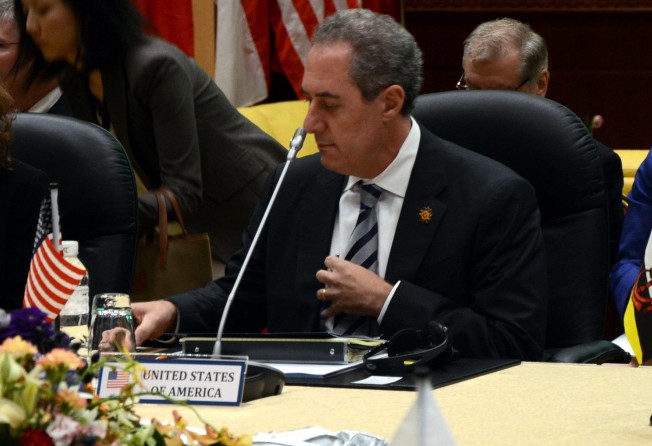US confident of TPP deal by October
Hurdles remain for 12-nation Trans-Pacific pact but top US official voices confidence after Brunei meeting, though some tariffs may stick

The United States and 11 other countries in the Asia-Pacific region have begun a final push to reach a landmark trade deal this year and hope for significant progress by an October meeting of leaders in Bali, the top US trade official said.
"It's not surprising that at the final stage of negotiation, as we enter the end game, [the most sensitive issues] are left on the agenda," US Trade Representative Michael Froman said on his way back from a meeting in Brunei with his counterparts involved in the Trans-Pacific Partnership (TPP) talks.
Froman left open the possibility that the agreement might not eliminate all tariffs among the 12 countries, which are the United States, Japan, Canada, Mexico, Australia, New Zealand, Peru, Chile, Vietnam, Malaysia, Singapore and Brunei.
He said a Japanese offer to eliminate 85 per cent of tariffs was "a good initial step … toward a comprehensive agreement".
Negotiators in Brunei on Friday began their 19th round of talks on the proposed pact after the meeting between Froman and other trade ministers.
The United States is under pressure in the talks to eliminate import restrictions on politically sensitive products such as sugar, dairy, footwear and clothing.
In exchange, its partners would adopt new rules on digital trade and the operations of state-owned enterprises, and bolster protections for workers and the environment.
Froman said the ministers laid out a path for smaller group negotiations leading up to a gathering in Bali in early October, where US President Barack Obama will meet with the heads of the other TPP countries.
"It'll be a good opportunity for leaders to get together and … give direction for any remaining issues to their negotiators," Froman said.
Hurdles remain both in striking agreement among the 12 nations and for individual governments in convincing citizens and businesses the TPP is in their national interest.
Japan, which only formally joined the negotiations last month, is under pressure from the US to open up its auto and insurance markets. Prime Minister Shinzo Abe, meanwhile, faces stiff domestic opposition, including from farmers who fear that foreign imports could drive them out of business.
Malaysia's government announced this month that it was initiating cost-benefit studies on the impact the TPP on its companies and said it would not be bound by a fixed timeline on negotiations.
Meanwhile, the White House faced heat last week for a tobacco-trade proposal it is making in the TPP talks.
New York Mayor Michael Bloomberg on Friday accused the Obama administration of bowing to pressure from the tobacco industry by proposing a provision in the TPP that he contended could challenge countries' tobacco-control measures.
Bloomberg wrote in The New York Times that would be "a colossal public-health mistake and potentially contribute to the deaths of tens of millions of people around the world".
On the other side, business groups such as the US Chamber and the American Farm Bureau Federation said the plan went too far by explicitly stating that nothing in the TPP pact would bar countries from regulating tobacco for public-health reasons, instead of relying on a more general protection already in place.
Froman said the proposal struck "the right balance" between trade and public-health interests. He said it made clear that countries have the right to regulate tobacco for public-health reasons.
Additional reporting by Associated Press